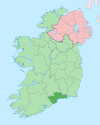Dungarvan
Dungarvan (Irish: Dún Garbhán, meaning 'Garbhann's Fort') is a coastal town and harbour in County Waterford, on the south-east coast of Ireland.
[10] The Anglo-Norman Dungarvan Castle, commissioned in the late 12th or early 13th century by King John of England,[11] stands by the harbour on the site of an earlier (possibly Hiberno-Norse) fortification.
[11] A 13th century Augustinian abbey, now the site of Saint Augustine's Catholic Church (built 1832), was founded by Thomas FitzMaurice FitzGerald (c.1145–1213).
[21] Irish language immersion education is available at pre-school and primary school level in Dungarvan's Gaelscoil, Scoil Garbhán.
A single-span bridge was built in the late 18th century by Lord Devonshire to link Dungarvan with Abbeyside and indeed Waterford via said causeway.
A friary in Abbeyside, founded by the Augustinians in the 13th century, is partially incorporated with the structure of a 20th-century Roman Catholic church.
One of the most significant colleges in the town was also founded by these Augustinians, whose order remains active locally and maintains a parish church nearer to Main Street.
[26] In everyday local usage, "Dungarvan" is taken to refer to the western, more commercial half of the town, where the administrative buildings and shopping areas are situated.
The Cork to London Eurolines coach, which provides a daily overnight cross channel service, stops at Dungarvan.
[citation needed] Bus Éireann Expressway route number 40 runs hourly in each direction providing a link to Cork, Waterford and Rosslare Europort.
Until 1967, Dungarvan had a railway station on the now dismantled Mallow to Waterford line and was served by the Rosslare to Cork boat train.
[36][37] The local electoral area (LEA) of Dungarvan elects six councillors to Waterford City and County Council.
[39] As of 2022, the consumer products company Haleon (previously part of GSK) had a manufacturing plant in Dungarvan which then employed approximately 900 people.
[48] Dungarvan participated in the 2018 Entente Florale competition, organised by the European Association for Flowers and Landscape (AEFP), and received a silver medal.
[49] Tadhg Gaelach Ó Súilleabháin (c. 1715 – 1795), a composer of 18th century Irish bardic poetry, lived in Dungarvan for several years.
[50] The British poet laureate, Sir John Betjeman (who lived in Ireland from 1941 to 1943) mentions Dungarvan in his poem, "The Irish Unionist's Farewell to Greta Hellstrom".





